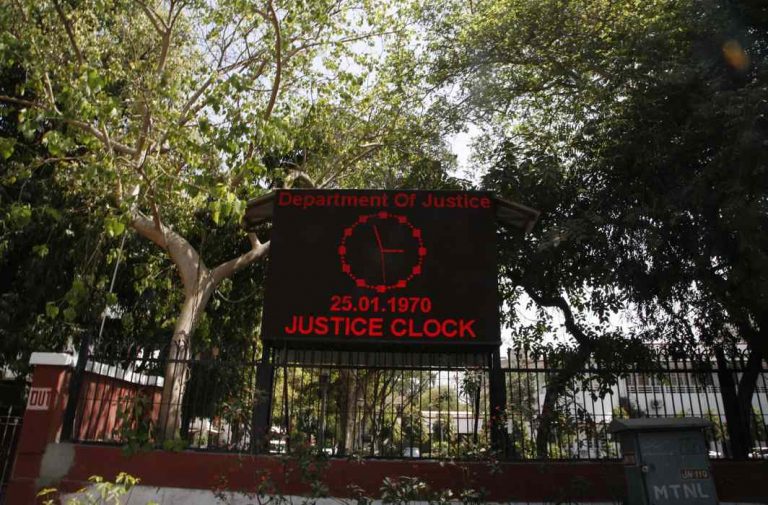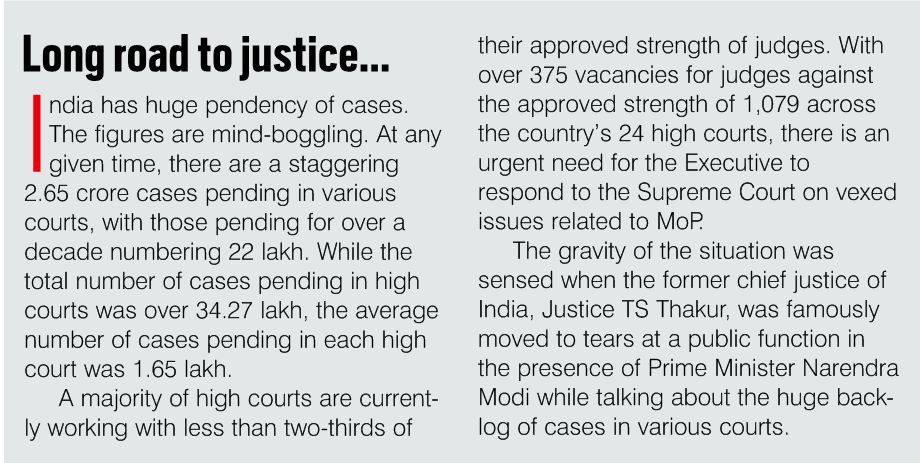
Above: The Justice Clock installed in Jaisalmer House in Delhi/Photo: Anil Shakya
Justice clocks will come up in all 24 high courts of the country and are aimed at reducing pendency—the bane of the justice delivery system
~By Justice Narendra Chapalgaonkar
When do we put our goals and targets on walls? Perhaps the best-known instance of this happening was during the time of Lord Louis Mountbatten, the last viceroy of India, who was determined to complete the process of transfer of power before August 15, 1947. He put up a notice board on a wall in his office showing the remaining days of British rule in India. The board must have helped the staff in speeding up the work.
Many government and industrial offices follow the practice of displaying the work assigned so that it becomes a target for the workforce there. Such boards also show work actually achieved. With the passage of time, such displays have lost their intended effect and are reduced to a mere formality. While they serve as a reminder to the staff working there, there must be genuineness as far as completion of work is concerned, which such reminders serve to stimulate.
NOVEL IDEA
In an attempt to tackle the huge pendency of cases in almost all courts of the country, a concerned Union government came up with a novel measure. Last year, Prime Minister Narendra Modi floated the idea of putting up LED display boards in all 24 high courts. These boards will reveal the daily rate of disposal of cases there and how many are pending. The boards will also indicate the rank of that court in achieving these parameters.
 A news item last week informed readers that the prime minister’s novel idea will soon be implemented. After all the high courts are provided with such boards, lower courts will also be given a similar facility.
A news item last week informed readers that the prime minister’s novel idea will soon be implemented. After all the high courts are provided with such boards, lower courts will also be given a similar facility.
The ever-growing number of cases pending in courts in India is not likely to show a downward trend in the absence of all-out efforts by all participants in the process of justice and that too without indulging in blame games.
I remember an incident relating to a district judge and his co-worker. The district judge was assigned the work of distribution of appeals and sessions cases among additional district judges working there. He would send sessions cases in which a large number of witnesses had to be examined to other judges and keep small cases involving offences like infanticide which required five or six witnesses to be examined with himself.
Naturally, trials in his cases were over within two-three days. However, a case with the additional sessions judge was about embezzlement of a huge amount of public money in which more than 100 witnesses had to be examined. That case was going on for a whole month. The district judge asked the additional sessions judge why he was not able to complete a single case when he himself had disposed of five sessions cases in the same period. The additional sessions judge was naturally annoyed and replied bluntly: “There is a difference in washing a quilt and washing handkerchiefs.”
Such a huge backlog of cases can lead to short tempers and may not always tell the whole truth about the efforts put in by various judges for speedy disposal of cases. However, in many cases, delays are avoidable.
TRUST IN SYSTEM
The purpose of putting such message boards is to create awareness. No doubt, it has a valid purpose. All the principal participants in the justice delivery system are aware of the disastrous consequences of delays in disposal. They not only harm the cause and the parties involved in a case, but hurt people’s faith in democratic and constitutional governance. When people are asked to choose a leader to rule them for five years despite criminal cases pending against him which cannot be heard before he is elected, how can we expect them to believe in the efficacy of the judicial system or even the constitutional order?
Boards giving information to litigants are already in operation in most high courts. The boards now proposed seem to be reminders to judges and advocates to get on with their jobs. Prima facie, there is nothing objectionable in the proposal.
If this is implemented well and helps in the intended purpose of reducing pendency, one may propose message boards in the law ministry too, reminding it about pending recommendations of the collegium and delay on its part which causes further pendency.
—The writer is a former judge of the Bombay High Court

